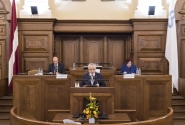
"When it comes to the implementation of the Rail Baltica project, there is no time and no place for disputes, indecision or short-term interests, because the project will have a significant impact on the movement of people and goods domestically and across borders," stated Jānis Vucāns, President of the Baltic Assembly (BA) and head of the Latvian delegation to the BA, on Friday, 28 October. He stressed that a targeted and irreversible development of the project must be a common goal of all Baltic States.
Addressing the participants of the 35th Session of the BA held in Riga, Vucāns pointed out that the issue will not disappear from the BA agenda until regular train traffic is established along this main line. He also stressed that the Rail Baltica would help reduce carbon dioxide emissions, create new jobs, and contribute to gross domestic product growth.
The BA President added that the agreement reached by the stakeholders was not just a symbolic step and investment in our region's future, but also a strong foundation for the security, prosperity and competitiveness of the Baltic people.
President Vucāns also called for closer economic cooperation between the Baltic States, including in attracting foreign investment, and highlighted other areas in need of stronger political support: “We should be aware that joint military procurement, master’s degree programmes, specialised medical centres, and food inspection laboratories are areas where cooperation will enable us to not only pool resources, but also drive cost reduction. Moreover, collaboration will develop our human resource potential in the relevant areas.”
The BA is a powerful parliamentary tool that helps the region achieve its important goals, said Jānis Vucāns, expressing his appreciation for the opportunity to make Riga the host of the session dedicated to the 25th anniversary of the BA. He added: “Today our cooperation is practical; it relies on implementing joint projects and solving shared problems. People count on our practical cooperation rather than political declarations. It is true that we have and will have areas prone to rather angry verbal exchanges. There will definitely be areas where each country will mostly think about their own interests. This does not mean that our cooperation is weak; on the contrary, it is the power of cooperation.”
Vucāns informed the participants of the BA Session about the performance of the Latvian Presidency and highlighted the success in coordinating closer cooperation among the Baltic border guards, which is particularly important in the light of migration and the refugee crisis. President Vucāns also emphasised the need to promote European values in the Baltic information space and to strengthen the media sector, as well as reported on defence and security cooperation, focusing on the issues of hybrid threat prevention.
A closer coordination network with the Baltic Council of Ministers was also developed during the Latvian Presidency, as it aims to push the Baltic parliaments and the executive branch for more inclusive and coherent policies.
On 27 and 28 October, MPs from Latvia, Estonia and Lithuania convened in Riga for the 35th Session of the Baltic Assembly in order to discuss such issues as migration and protection of the external border of the European Union, the demographic situation in the Baltic States, as well as the development of regional transport infrastructure, with a special emphasis on the Rail Baltica project.
About the Baltic Assembly:
Latvia assumed the Presidency of the Baltic Assembly on 1 January 2016.
The Baltic Assembly is an interparliamentary cooperation organisation of Latvia, Estonia and Lithuania established on 8 November 1991. Each national parliament of the Baltic States is represented in the Baltic Assembly by 12 to 20 members of parliament. It is a coordinating and consultative organisation which has a right to express its opinion to the national parliaments and governments of the Baltic States, as well as the Baltic Council of Ministers, in the form of resolutions, decisions, declarations and recommendations; it also has a right to request the above-mentioned bodies to provide information on cross-border issues that are high on the Baltic Assembly’s agenda.
Photos: https://www.flickr.com/photos/saeima/sets/72157672218931763
Disclaimer & copyrights: https://www.saeima.lv/en/copyrights
Saeima Press Service







